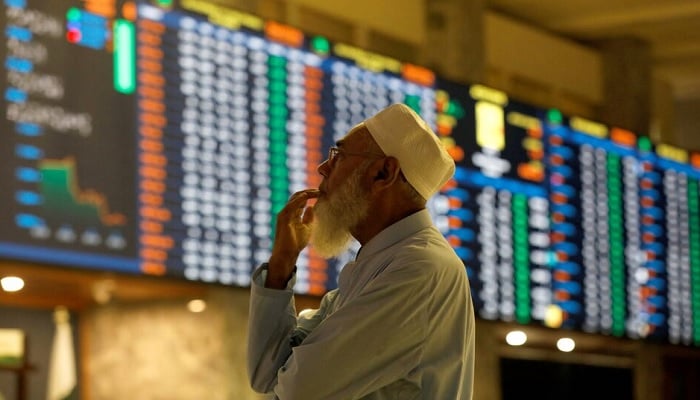
[ad_1]
Stocks tested new highs on Wednesday as the smooth sailing of the Shanghai Cooperation Organisation (SCO) summit in Islamabad lifted sentiment amid renewed hopes for regional, political, and economic stability, further fueling the earnings season rally.
The Pakistan Stock Exchange’s (PSX) benchmark KSE-100 Index secured 365 points, or 0.43%, to finish at 86,205 points, after surging by a massive 673 points to touch 86,513 in early intraday trade.
The two-day meeting of the Council of Heads of Government (CHG) of the SCO kicked off in Islamabad on Tuesday amid hopes of possible positive diplomatic engagements.
The first quarter (1QFY2024) corporate earnings season is getting into gear, with robust forecasts and bullish investors increasingly taking positions in high-valuation sectors as the capital market continues to scale new record highs.
Reacting to the early bull-run, Khurram Schehzad, CEO of Alpha Beta Core, stated, “Successfully organising a major global event like SCO summit, bringing together regional leaders, especially the arrival of Indian external affairs minister, must have further strengthened investor confidence.”
The meeting of the SCO, a Eurasian security and political group formed in 2001 by Russia and China, is the highest-profile event hosted by the South Asian nation in years.
Indian Foreign Minister Subrahmanyam Jaishankar is also in Pakistan for the SCO meeting, marking the first such visit in almost a decade.
Saad Ali, Director of Research at Intermarket Securities, informed Geo.tv that investor sentiment strengthened after headway on the highly-contested government-proposed bill, and the perceived low likelihood of Pakistan Tehreek-e-Insaf (PTI) protests in Islamabad.
“The market has also digested and priced in the negative impact of termination/modification of PPAs (Power Purchase Agreements) of old IPPs (Independent Power Producers),” Ali added.
Last week Prime Minister Shehbaz Sharif announced that five (IPPs) had agreed to cancel their PPAs with the government “voluntarily”, which he said would provide inflation-hit consumers with an annual relief of Rs60 billion.
Ahsan Mehanti at Arif Habib Corporation, in a conversation with Geo.tv, said that stocks rallied as investors considered reduced political uncertainty and economic gains from the SCO summit.
“A decline in bond yields and the government’s discussions about privatising state-owned enterprises contributed to the bullish activity in PSX,” Mehanti added.
In recent months, the one-year Treasury Bill (T-Bill) and three-year Pakistan Investment Bond (PIB) rates have been trading near 13% and 12%, respectively. Analysts attribute this decrease to an increased demand for fixed-income securities, resulting in capital appreciation.
Talking to Geo.tv, Tahir Abbas, Head of Investment Research at Arif Habib Ltd (AHL), said that as the financial results were pouring in, investors were strategically positioning themselves to make the most of the payouts, maintaining a strong momentum in the market in the process.
Abbas also said that the Monetary Policy Committee of the central bank was expected to reduce interest rates by 200-250 basis points (bps) in their upcoming meeting in November.
The AHL analyst attributed the ongoing rally in the market to decreasing inflation, lower policy rates, improved corporate profitability, and generally positive economic indicators.
Highlighting that the market was trading at a price-to-earnings ratio of 4.2x, while its 6-year average was around 6x, Abbas forecast the rally to stay the course, citing ample room for the market to move upwards.
The State Bank of Pakistan’s MPC slashed the key policy rate by 200bps to 17.5% from the existing 19.5%, the State Bank of Pakistan (SBP) announced on September 12, as inflation eased to the first single-digit figure in nearly three years.
Capital market has been mostly steady or positive since the approval of the International Monetary Fund’s (IMF) long-awaited $7 billion bailout deal for Pakistan to stabilise its struggling economy.
However, the IMF has linked the success of the new programme to “sound policies and reforms” aimed at strengthening macroeconomic stability and addressing structural challenges, alongside “continued strong financial support from Pakistan’s development and bilateral partners.
[ad_2]
Source link
